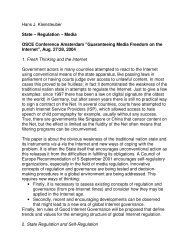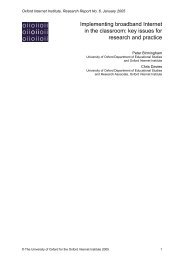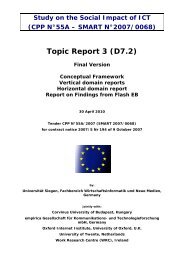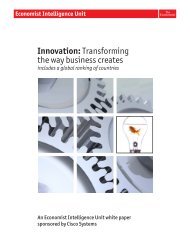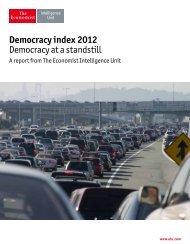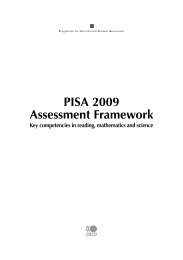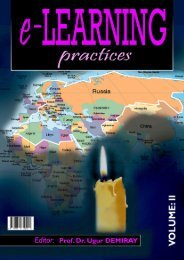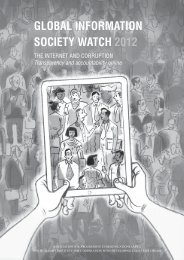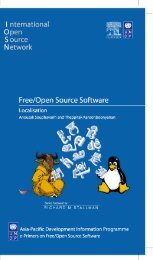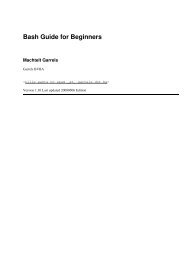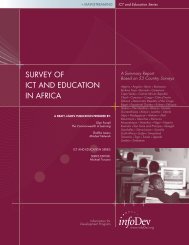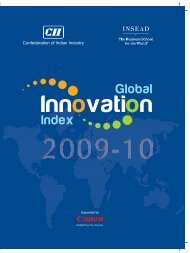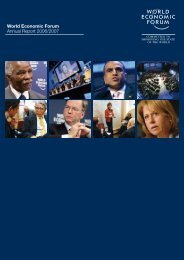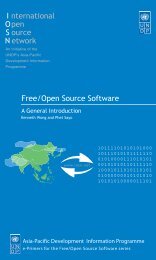Legal Aspects of the Information Society. - Free Technology Academy
Legal Aspects of the Information Society. - Free Technology Academy
Legal Aspects of the Information Society. - Free Technology Academy
You also want an ePaper? Increase the reach of your titles
YUMPU automatically turns print PDFs into web optimized ePapers that Google loves.
GNUFDL • 9 Introduction to <strong>the</strong> legal aspects <strong>of</strong> <strong>the</strong> information society<br />
2. The free s<strong>of</strong>tware model<br />
The free s<strong>of</strong>tware movement uses several arguments to defend its position and<br />
it is important to consider that such arguments have important legal impacts.<br />
To understand <strong>the</strong> free and open source s<strong>of</strong>tware initiative, we consider it to<br />
be useful to briefly comment on <strong>the</strong>se arguments.<br />
2.1. The <strong>the</strong>ory <strong>of</strong> <strong>the</strong> social genesis <strong>of</strong> understanding<br />
The first argument used by <strong>the</strong> defendants <strong>of</strong> free s<strong>of</strong>tware is philosophicalideological.<br />
The basic principle is that knowledge as such does not belong to<br />
any one person, as all knowledge is based on earlier knowledge and is a copy,<br />
to a greater or lesser extent, <strong>of</strong> o<strong>the</strong>r ideas. Think <strong>of</strong> what Newton said about<br />
"standing on <strong>the</strong> shoulders <strong>of</strong> giants".<br />
In o<strong>the</strong>r words, no one has ideas that have not been directly or indirectly influenced<br />
by social relations maintained in <strong>the</strong> communities <strong>of</strong> which <strong>the</strong>y form<br />
part and if <strong>the</strong> genesis is social, <strong>the</strong> use must in turn remain social. The main<br />
function <strong>of</strong> <strong>the</strong> generation <strong>of</strong> knowledge is to improve society and, <strong>the</strong>refore,<br />
to reach <strong>the</strong> largest possible number <strong>of</strong> people.<br />
If we were to consider s<strong>of</strong>tware as knowledge, <strong>the</strong> argument made by organisations<br />
such as FSF seems simple. The most direct consequence <strong>of</strong> this philosophy<br />
<strong>of</strong> <strong>the</strong> social genesis <strong>of</strong> knowledge, from a legal viewpoint, is that<br />
<strong>the</strong> copyright law limitation against copying, using or redistributing s<strong>of</strong>tware<br />
makes no sense, as it hinders <strong>the</strong> generation <strong>of</strong> new knowledge and does not<br />
allow for <strong>the</strong> accomplishment <strong>of</strong> its main purpose: returning to <strong>the</strong> community.<br />
Example<br />
In Spain, for instance, in 2004, <strong>the</strong> Regional Government <strong>of</strong> Extremadura launched<br />
LinEX, a broad program to promote <strong>the</strong> creation <strong>of</strong> distribution based on Debian GNU/<br />
Linux, for <strong>the</strong> purpose <strong>of</strong> installing it at all public education centres in <strong>the</strong> region. There<br />
are clearly technological and economic reasons behind this decision. However, <strong>the</strong> legal<br />
consequences are equally important: <strong>the</strong> use <strong>of</strong> free s<strong>of</strong>tware provides <strong>the</strong> freedom to disseminate<br />
s<strong>of</strong>tware among all citizens and residents, without <strong>the</strong> need to acquire ano<strong>the</strong>r<br />
licence. The Regional Government may also easily modify <strong>the</strong>se systems to adapt <strong>the</strong>m<br />
to local needs, without requesting permission from <strong>the</strong> original owners –a considerable<br />
legal independence strategy. Educational centres benefit from <strong>the</strong> program, as <strong>the</strong>y do<br />
not depend on suppliers (<strong>of</strong> s<strong>of</strong>tware or maintenance and upgrading services). And <strong>the</strong>y<br />
may open <strong>the</strong> source code <strong>of</strong> <strong>the</strong> applications installed for educational purposes (computer<br />
classes, etc.).



